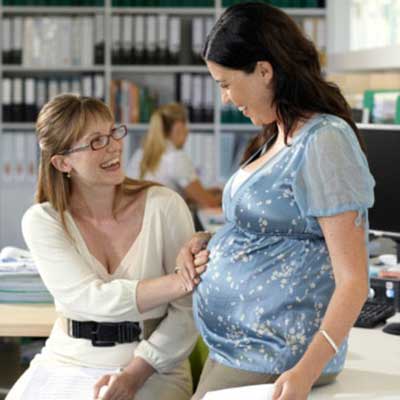|
 Giving birth later in life: Some 20 per cent of babies born in England and Wales last year had mothers aged 35 and over. |
|
One in five babies are now born to women over 35 as would-be parents feel pressure of high mortgages and debt. One in five mothers is approaching middle age by the time she has a child, figures have revealed. The boom in motherhood among older women means more than 140,000 babies were born to women of 35 or older last year - 20 per cent of all births in England and Wales. The proportion of babies with mothers in their late 30s and older has gone up by a third in ten years as more women delay having families. Fathers are also increasingly likely to be close to middle age when they are faced with bringing up young children. The latest count showed that two thirds of new fathers are over 30. The breakdown from the Office for National Statistics raised new questions over the trend for parents to be older and its impact on the health and upbringing of children. Medical authorities say there are greater risks for mothers and babies when mothers are over 35, and older parents face a greater chance of ill-health or disability while their children are still young. Numbers of older mothers have been shooting up in recent years, partly because more women are choosing education and careers over early marriage and family, and partly because many reach their 30s burdened with high mortgages, debt, and living costs that encourages them to postpone having children. The trend to co-habitation rather than marriage also means many women are unwilling to have children while they are uncertain about the degree of commitment of their partner. The new figures showed that 141,246 babies were born to mothers over the age of 35 last year, a fifth of the 706,248 births in England and Wales. Of these, nearly 27,000 were born to mothers over 40; nearly 1,500 to mothers over 45, and 89 to women over the age of 50. In 1999, only 15 per cent of newborn babies had mothers over 35. There have been a series of warning to older mothers about the risks of having children later in life. Earlier this year Royal College of Obstetricians and Gynaecologists President Professor Sir Sabaratnam Arulkumaran said: 'Later pregnancy is associated with more complications and specialised obstetric help is required to care for this growing group of women.' (Read by Nelly Min. Nelly Min is a journalist at the China Daily Web site.) (Agencies) |
由于父母迫于高额房贷和债务的压力,英国有五分之一的宝宝出生时,妈妈的年龄都超过了35岁。 数据显示,五分之一的母亲生孩子时都已接近中年。 高龄产妇的人数迅速增多,去年由35岁以上的产妇所生的宝宝人数超过14万,占英格兰和威尔士所有新生儿的20%。 由于越来越多的女性推迟成家,35岁以上的产妇数量在十年内增加了三分之一。 年近不惑同时又要养育小孩的爸爸也越来越多。最新统计显示,三分之二的新爸爸年龄都超过了30岁。 英国国家统计局系统的数据分析使得人们对父母生育年龄增长的趋势,及其对孩子的健康和成长的影响提出了一些新的质疑。 医学专家称,超过35岁生孩子对产妇和宝宝都存在着较大的风险,而且年龄较大的父母在孩子尚年幼时,健康出状况的可能性更大。 高龄产妇的数量近几年来迅速增加,一部分原因是越来越多的女性选择接受教育和专注于事业,而不是早早结婚生子。还有一部分原因在于许多30多岁的女性背负着高额的房贷、债务和生活费用,迫使她们推迟生孩子。 伴侣间越来越多地选择同居而非结婚,这一趋势也意味着许多女性在不能确定伴侣的忠实程度时不愿意生小孩。 新的数据表明,去年,在英格兰和威尔士,年龄在35岁以上的女性所生育的婴儿达14.1万,占两地新生儿总数(70.6万)的五分之一。 其中,近2.7万婴儿的母亲年龄超过40岁,近1500个婴儿的母亲年龄超过45岁,还有89个婴儿的母亲年龄超过了50岁。而在1999年,只有15%的新生儿的母亲年龄在35岁以上。 一直以来,高龄产妇们也经常会听到有关晚育风险的警告。 今年早些时候,英国皇家妇产科学院院长萨巴拉特南•阿鲁库马兰教授曾说道:“晚育容易引起更多并发症。而且这些日益增多的高龄产妇,也需要特殊的分娩护理。” 相关阅读 (中国日报网英语点津 实习生强凤华 编辑:陈丹妮) |
|
Vocabulary: Obstetricians and Gynaecologists: 妇产科医师 obstetric: of or relating to or used in or practicing obstetrics(产科的;产科学的;生产的) |
